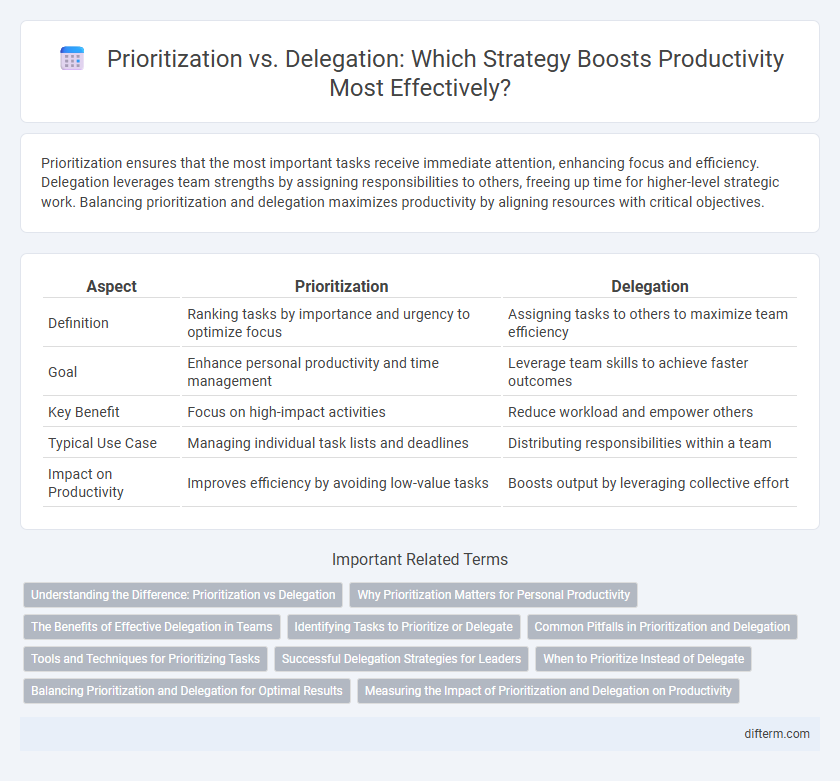Prioritization ensures that the most important tasks receive immediate attention, enhancing focus and efficiency. Delegation leverages team strengths by assigning responsibilities to others, freeing up time for higher-level strategic work. Balancing prioritization and delegation maximizes productivity by aligning resources with critical objectives.
Table of Comparison
| Aspect | Prioritization | Delegation |
|---|---|---|
| Definition | Ranking tasks by importance and urgency to optimize focus | Assigning tasks to others to maximize team efficiency |
| Goal | Enhance personal productivity and time management | Leverage team skills to achieve faster outcomes |
| Key Benefit | Focus on high-impact activities | Reduce workload and empower others |
| Typical Use Case | Managing individual task lists and deadlines | Distributing responsibilities within a team |
| Impact on Productivity | Improves efficiency by avoiding low-value tasks | Boosts output by leveraging collective effort |
Understanding the Difference: Prioritization vs Delegation
Prioritization involves ranking tasks based on urgency and importance to maximize productivity, ensuring critical activities receive immediate attention. Delegation assigns specific responsibilities to team members, leveraging their strengths to distribute workload effectively and enhance overall efficiency. Understanding the difference between prioritization and delegation enables better time management and resource allocation within any project or workflow.
Why Prioritization Matters for Personal Productivity
Prioritization matters for personal productivity because it ensures that the most important tasks receive immediate attention, maximizing efficient use of time and energy. By focusing on high-impact activities, individuals can achieve meaningful progress toward their goals without becoming overwhelmed by less critical assignments. Effective prioritization reduces stress, enhances decision-making, and promotes sustained productivity over time.
The Benefits of Effective Delegation in Teams
Effective delegation in teams enhances productivity by distributing tasks according to individual strengths, ensuring faster project completion and higher-quality results. It empowers team members, fosters skill development, and increases overall engagement and accountability. By allowing leaders to focus on strategic priorities, delegation optimizes resource allocation and drives organizational success.
Identifying Tasks to Prioritize or Delegate
Effective productivity hinges on accurately identifying tasks based on urgency and impact, prioritizing high-value activities that align with core goals while delegating routine or specialized tasks to appropriate team members. Utilizing frameworks like the Eisenhower Matrix enables clear differentiation between urgent and important tasks, enhancing decision-making in task allocation. Leveraging delegation not only optimizes workload distribution but also fosters skill development and accountability within teams.
Common Pitfalls in Prioritization and Delegation
Common pitfalls in prioritization include misidentifying urgent tasks as important, leading to reactive work that disrupts long-term goals. In delegation, common errors involve unclear communication of expectations and lack of proper follow-up, resulting in incomplete or low-quality outcomes. Both flawed prioritization and delegation practices diminish overall productivity by causing misaligned efforts and wasted resources.
Tools and Techniques for Prioritizing Tasks
Effective prioritization tools such as the Eisenhower Matrix and the ABCDE Method enable individuals to categorize tasks by urgency and importance, optimizing workflow management. Techniques like time-blocking combined with digital task managers, including Todoist or Trello, facilitate clear visual organization and deadline tracking. Leveraging these prioritization strategies enhances productivity by ensuring focus remains on high-impact activities before considering delegation options.
Successful Delegation Strategies for Leaders
Successful delegation strategies for leaders involve clearly defining tasks and aligning them with team members' strengths to maximize productivity and efficiency. Establishing accountability through specific deadlines and regular check-ins ensures progress and fosters trust within the team. Effective communication and providing necessary resources empower employees, driving higher engagement and successful project outcomes.
When to Prioritize Instead of Delegate
Prioritize tasks that require your unique skills, decision-making authority, or strategic input to maximize productivity impact. Delegate routine, time-consuming, or specialized activities that others can handle efficiently to free up your focus on high-value work. Effective prioritization ensures critical goals are met while delegation optimizes team capacity and workflow.
Balancing Prioritization and Delegation for Optimal Results
Balancing prioritization and delegation enhances productivity by ensuring high-impact tasks receive focused attention while appropriate responsibilities are assigned to capable team members. Effective prioritization identifies urgent and important activities, whereas strategic delegation leverages diverse skills to optimize workflow and resource utilization. Mastering this balance minimizes overload and accelerates goal achievement across projects.
Measuring the Impact of Prioritization and Delegation on Productivity
Measuring the impact of prioritization and delegation on productivity involves analyzing key performance indicators such as task completion rates, time efficiency, and output quality. Prioritization improves focus on high-value activities, directly boosting productivity by ensuring critical tasks receive appropriate attention. Delegation enhances capacity by distributing workloads, enabling teams to accomplish more, which can be quantitatively assessed through increased throughput and reduced bottlenecks.
Prioritization vs Delegation Infographic

 difterm.com
difterm.com